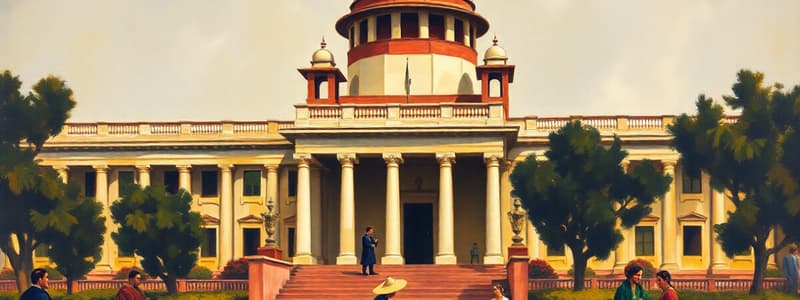Podcast
Questions and Answers
What are the main functions of the judiciary?
What are the main functions of the judiciary?
The main functions of the judiciary are to interpret and explain laws, punish violators, and protect citizens' rights.
How is the composition of the Supreme Court structured?
How is the composition of the Supreme Court structured?
The Supreme Court consists of the Chief Justice and 30 other judges.
What qualifications must one meet to become a judge of the Supreme Court?
What qualifications must one meet to become a judge of the Supreme Court?
A judge must be an Indian citizen, have served as a High Court judge for at least five years, have at least ten years of advocacy experience, or be a distinguished jurist.
What is the term limit for judges of the Supreme Court?
What is the term limit for judges of the Supreme Court?
On what grounds can a Supreme Court judge be removed?
On what grounds can a Supreme Court judge be removed?
What are the three types of jurisdiction held by the Supreme Court?
What are the three types of jurisdiction held by the Supreme Court?
What does original jurisdiction entail for the Supreme Court?
What does original jurisdiction entail for the Supreme Court?
What role does the President play in the appointment of Supreme Court judges?
What role does the President play in the appointment of Supreme Court judges?
What is the advisory jurisdiction of the Supreme Court of India?
What is the advisory jurisdiction of the Supreme Court of India?
Define the concept of judicial review as exercised by the Supreme Court of India.
Define the concept of judicial review as exercised by the Supreme Court of India.
What distinguishes a court of record from other courts?
What distinguishes a court of record from other courts?
What is the purpose of the writ of habeas corpus?
What is the purpose of the writ of habeas corpus?
Explain the writ of mandamus and its significance.
Explain the writ of mandamus and its significance.
What qualifications are required to become a judge of the High Court in India?
What qualifications are required to become a judge of the High Court in India?
What is the term of office for a judge of the High Court?
What is the term of office for a judge of the High Court?
What powers does the High Court hold over subordinate courts?
What powers does the High Court hold over subordinate courts?
Identify the types of cases handled by subordinate courts in India.
Identify the types of cases handled by subordinate courts in India.
Who is responsible for the appointment of district judges in subordinate courts?
Who is responsible for the appointment of district judges in subordinate courts?
Flashcards are hidden until you start studying
Study Notes
Judiciary Overview
- The judiciary is the third branch of government responsible for interpreting laws, punishing law violators, and protecting citizens' rights.
- Consists of three levels: Supreme Court, High Courts, and Subordinate Courts.
The Supreme Court
- Established as the highest court in India, located in Delhi; serves as a central government branch.
- Responsible for interpreting the Constitution and laws, with binding judgments.
Composition and Structure
- Comprised of the Chief Justice and 30 other judges.
- Chief Justice appointed by the president on the advice of the Council of Ministers.
- Other judges appointed by the president, based on recommendations from the Council of Ministers and Chief Justice.
Qualifications for Judges
- Must be an Indian citizen.
- Have served at least five years as a High Court judge or ten years as an advocate in a High Court.
- Recognized as a distinguished jurist by the president.
Terms of Office
- Judges serve until the age of 65; cannot be removed by the president unless impeached.
- Impeachment requires a two-thirds majority vote in both houses of Parliament on grounds of misbehavior or incapacity.
Powers and Functions
-
Jurisdictions include original, appellate, and advisory.
- Original jurisdiction: First hearings in disputes involving states or issues of public importance.
- Appellate jurisdiction: Reviews cases from High Courts upon appeal.
- Advisory jurisdiction: Advises the president on laws and can review bills before presidential assent.
-
Judicial review enables the Supreme Court to evaluate the constitutionality of laws and executive orders.
-
Operates as a court of record, maintaining permanent records of proceedings and judgments.
Issuing Writs
- Authorized to issue writs for legal actions:
- Habeas Corpus: Protects against illegal detention; mandates presentation of detained individuals in court.
- Mandamus: Directs public officials to perform their duties when they fail to do so.
High Court
- Heads the state-level judiciary, led by a Chief Justice and additional judges as appointed by the president.
- Judges must have held a judicial office or practiced as advocates for at least ten years.
- Can issue writs and oversee subordinate courts in the state.
Subordinate Courts
- Include District and Sessions Courts, Provincial Courts, and Nyaya Panchayats.
- Handle civil (e.g., property, contract disputes) and criminal cases (e.g., theft, murder).
- Governed by the High Court of each state, ensuring uniformity in structure and functions across the country.
Studying That Suits You
Use AI to generate personalized quizzes and flashcards to suit your learning preferences.




